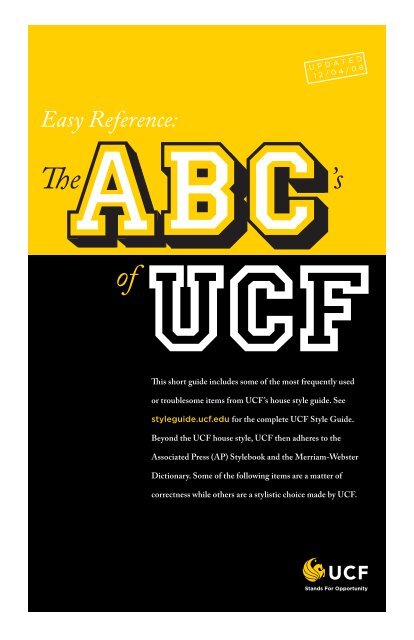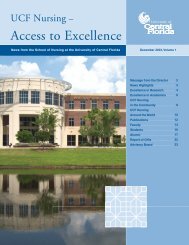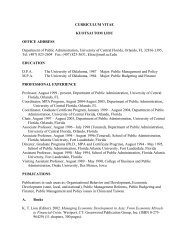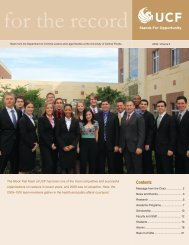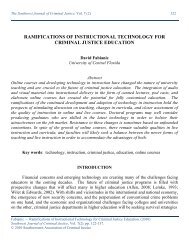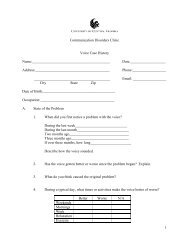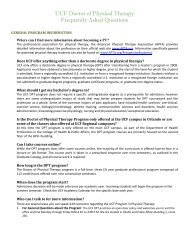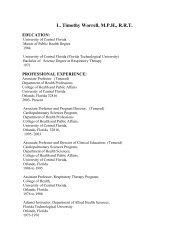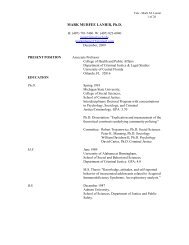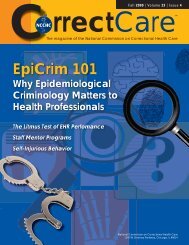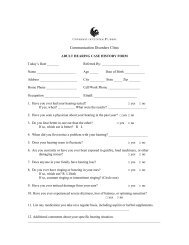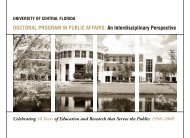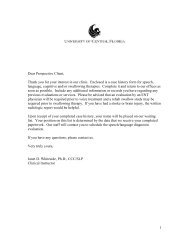UCF Style Guide - University of Central Florida
UCF Style Guide - University of Central Florida
UCF Style Guide - University of Central Florida
You also want an ePaper? Increase the reach of your titles
YUMPU automatically turns print PDFs into web optimized ePapers that Google loves.
U P D A T E D<br />
12/04/08<br />
Easy Reference:<br />
The ’s<br />
<strong>of</strong><br />
<strong>UCF</strong><br />
This short guide includes some <strong>of</strong> the most frequently used<br />
or troublesome items from <strong>UCF</strong>’s house style guide. See<br />
styleguide.ucf.edu for the complete <strong>UCF</strong> <strong>Style</strong> <strong>Guide</strong>.<br />
Beyond the <strong>UCF</strong> house style, <strong>UCF</strong> then adheres to the<br />
Associated Press (AP) <strong>Style</strong>book and the Merriam-Webster<br />
Dictionary. Some <strong>of</strong> the following items are a matter <strong>of</strong><br />
correctness while others are a stylistic choice made by <strong>UCF</strong>.
A<br />
academic degrees. Abbreviations with<br />
periods and no spaces for all degrees including:<br />
B.A., B.S., Ph.D., B.F.A., M.F.A. and M.B.A.<br />
Capitalize formal names <strong>of</strong> academic degrees<br />
such as Bachelor <strong>of</strong> Science. Do not capitalize<br />
the specific field <strong>of</strong> the degree such as B.S. in<br />
management.<br />
adviser. Preferred spelling, though advisor is<br />
also correct.<br />
assistant/associate pr<strong>of</strong>essor, dean, vice<br />
president, director. Lowercase in most cases.<br />
Capitalize only when using a specific title<br />
or preceding a person’s name (see titles).<br />
Do not abbreviate.<br />
B<br />
bachelor’s degree. Use an apostrophe and<br />
the word “degree” or “program” when referring<br />
to degrees in general.<br />
buildings. Always capitalize the names <strong>of</strong><br />
buildings such as the Visual Arts building.<br />
Use full name on first reference. On second<br />
reference, lowercase when proper name is not<br />
used. the building; the center<br />
C<br />
campuswide. Do not hyphenate campuswide,<br />
universitywide or citywide.<br />
chair. Not chairman, chairwoman or<br />
chairperson.<br />
commas. Use a comma after each item<br />
in a series, but not after a conjunction<br />
(and, or) such as: The building is large,<br />
modern and beautiful. Do use a comma in a<br />
complex series <strong>of</strong> items or with an additional<br />
conjunction such as: The building is large,<br />
modern and wired, and beautiful.<br />
Composition titles. Titles <strong>of</strong> magazines,<br />
books and journals require no italics or<br />
quotation marks. For movies, operas, plays,<br />
computer games, poems, titles <strong>of</strong> albums and<br />
songs, television shows, and titles <strong>of</strong> lectures,<br />
speeches and works <strong>of</strong> art, enclose with<br />
quotation marks.<br />
The ABC’s <strong>of</strong> <strong>UCF</strong><br />
D<br />
department, division or center. Capitalize<br />
as part <strong>of</strong> formal names. Lowercase when used<br />
alone to refer to a particular department: the<br />
department.<br />
doctoral is an adjective: He earned his<br />
doctoral degree.<br />
doctorate is a noun: He earned his doctorate.<br />
double-spacing between sentences.<br />
Don’t. That is all.<br />
E<br />
e-mail, e-mailed and e-mailing.<br />
Use a hyphen.<br />
F<br />
faculty. Lowercase when not part <strong>of</strong> a title.<br />
Freshman is singular. Freshmen is plural.<br />
Lowercase all class-standing designations<br />
when not beginning a sentence—classes are<br />
sophomore, junior, senior and graduate.<br />
G<br />
gender. Neither “man” nor “mankind” is a<br />
generic reference. Instead, refer to “people”<br />
or “humankind.” Do not use “he” or “his” as<br />
a generic term when you are unsure <strong>of</strong> the<br />
subject’s gender; try non-gender-specific terms<br />
such as “student” instead.<br />
GPA. Acceptable on all references—capitalize<br />
and do not include periods.<br />
H<br />
health care. Two words, unless part <strong>of</strong> a<br />
formal name.<br />
high-tech. Always hyphenate.<br />
I<br />
Internet. Always capitalize.
K<br />
Knights. An informal reference to the<br />
university’s formal athletic name. Capitalize<br />
when referring to the <strong>UCF</strong> Knights.<br />
L<br />
lectern. A speaker stands behind a lectern,<br />
on a podium, in a pulpit and on a rostrum.<br />
M<br />
millions and billions. Use figures with<br />
the words million or billion. Use decimals<br />
to show fractions <strong>of</strong> millions and billions<br />
($2.5 million), but don’t use more than two<br />
decimal places.<br />
N<br />
nationalities. Nationalities should be<br />
capitalized. Do not hyphenate terms such as<br />
“African American” or “American Indian.”<br />
Consider individual wishes (i.e. many people<br />
prefer the term “black” or the term “Native<br />
American”), but otherwise follow AP<br />
<strong>Style</strong>book guidelines.<br />
numbers. Use figures for 10 and above and<br />
to denote age, but spell out numbers zero<br />
through nine in all other examples; for the<br />
beginning <strong>of</strong> sentences, spell out numbers<br />
(except years). Do not use fractions—<br />
convert to decimals or a percentage.<br />
O<br />
on-campus and <strong>of</strong>f-campus. Use a<br />
hyphen when used as a descriptive term<br />
such as on-campus housing, but otherwise<br />
as in: They lived on campus.<br />
online. Lowercase. No hyphen.<br />
over. Use only as a spatial reference and<br />
use “more than” in all other instances.<br />
Reword phrases such as “over $121 million<br />
in research funding” to say “more than $121<br />
million in research funding.”<br />
P<br />
percent. Spell it out. No symbol.<br />
podcast. Use as one word and lowercase.<br />
punctuation. Only use exclamation<br />
marks to show extreme emotion. Always<br />
place commas and periods inside a closing<br />
quotation mark.<br />
Q<br />
Reflecting Pond. Never Reflection Pond,<br />
Reflecting Pool or the Fountain.<br />
R<br />
residence halls. Residence halls is the<br />
preferred term, instead <strong>of</strong> dorms.<br />
S<br />
school. School can be used to refer to <strong>UCF</strong>,<br />
but limit use as university is the preferred<br />
term. Only capitalize for specific units, such<br />
as the School <strong>of</strong> Social Work.<br />
seasons and semesters. Lowercase unless<br />
referencing a specific term such as Fall 2007.<br />
Stands For Opportunity. Capitalize each<br />
word <strong>of</strong> our tagline at all times.<br />
T<br />
Theatre and theater. Use the former<br />
spelling for names such as <strong>UCF</strong>’s<br />
department (<strong>UCF</strong> Conservatory Theatre),<br />
but the latter in all other references such as<br />
<strong>UCF</strong> theater students.<br />
times. Double zeros are not necessary.<br />
Also, “a.m.” and “p.m.” should be lowercase<br />
in body copy and include periods. Use 9 a.m.<br />
instead <strong>of</strong> 9:00 a.m.—only use 9 AM when<br />
design calls for it.<br />
titles. Capitalize academic and business<br />
titles such as provost, dean, chancellor<br />
or chair only when they precede a name<br />
such as Provost Terry Hickey. Lowercase<br />
titles that follow names such as: Terry<br />
Hickey, provost.<br />
The ABC’s <strong>of</strong> <strong>UCF</strong>
The ’s<br />
<strong>of</strong><br />
<strong>UCF</strong><br />
Answers & Information<br />
<strong>Style</strong> <strong>Guide</strong>/ABC questions<br />
jentaylo@mail.ucf.edu<br />
<strong>UCF</strong> Marketing<br />
407-823-2504<br />
universitymarketing.ucf.edu<br />
Graphic Standards<br />
www.umark.ucf.edu/logo/<br />
graphics@mail.ucf.edu<br />
U<br />
<strong>University</strong> <strong>of</strong> <strong>Central</strong> <strong>Florida</strong>.<br />
<strong>UCF</strong> (or ‘the university’) on second reference<br />
or, for inhouse publications, on first reference.<br />
Always capitalize “<strong>UCF</strong>.” Never separate<br />
or punctuate the letters. Never abbreviate a<br />
single word or portions <strong>of</strong> the university’s<br />
name—always choose between the <strong>University</strong><br />
<strong>of</strong> <strong>Central</strong> <strong>Florida</strong>, <strong>UCF</strong> or the university.<br />
W<br />
Web and Web site. Web is always<br />
capitalized when referring to the World<br />
Wide Web. Web site is two words.<br />
Exceptions: webcam, webmaster and<br />
webcast.<br />
Y<br />
years. Do not use an apostrophe for a span<br />
<strong>of</strong> years, such as 1950s, 1990s; it is acceptable<br />
to start sentences with numerals for years<br />
(the only exception to starting a sentence<br />
with numerals), e.g. 2006 marked a new era<br />
for <strong>UCF</strong>.<br />
year-end and year-to-date. Hyphenate.


